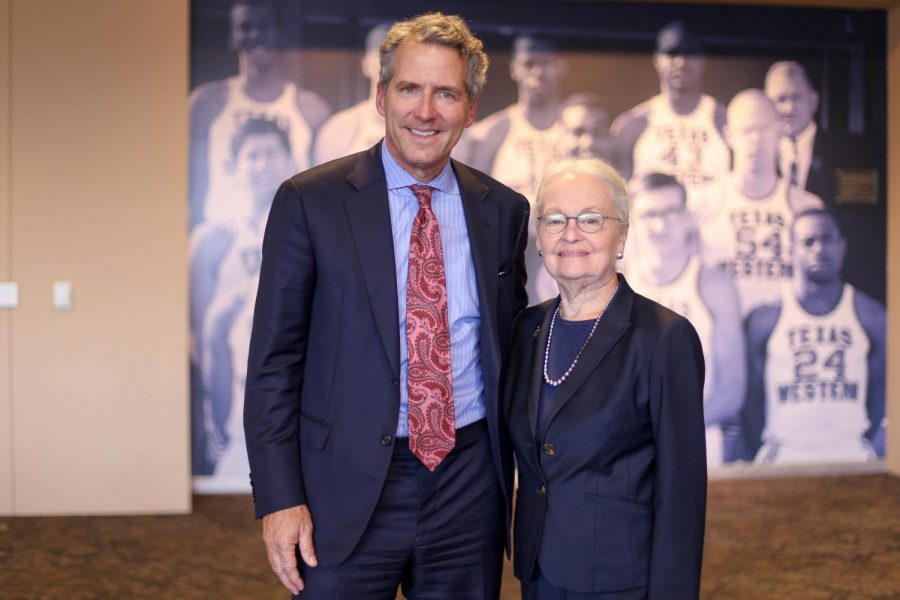The University of Texas Board of Regents appointed James B. Milliken as the new chancellor of the UT System in late August, and on Oct. 25, Milliken paid a visit to UTEP.
On Sept. 17, Milliken took charge of Texas’s most renowned public university system, which holds fourteen colleges and institutions and educates over 235,000 students. Milliken has an impressive record—thirty years of experience—working in public higher education following his appointment.
As the former senior administrator in the University of North Carolina, president of the University of Nebraska and chancellor of the City University of New York (CUNY), Milliken is optimistic that he can handle the University of Texas System and has ideas in place for the advancement of this system.
“I saw a great deal of opportunity and optimism and competence in Texas,” the new chancellor said. “There’s no question that we need more higher education in this country. Especially public higher education, which educates 70 percent of the people in the country with college degrees. We need to offer more opportunity to more people and I think people in Texas get this. This state is going to almost double in population over the next thirty years, and we’re going to need many more educated people in the state of Texas.”
The distribution of opportunity is something that Milliken feels strongly about. To him, opportunities should not just be consistent with wealth. From his experience being at four different university systems, he’s taken away an important ideology.
“Talent is distributed evenly without regard to demographic distinction, without regard to wealth, zip code, race, ethnicity, gender. But opportunity is not,” Milliken said. “Most opportunities to go to the best schools, to graduate on time, to launch great careers, are still correlated with wealth. And the difference maker is higher education. The way that we are able to capitalize on opportunity is with our public colleges and universities.”
Milliken compares UTEP to CUNY, two great engines of social and economic mobility that have moved more students from the lowest quintile of wealth to the middle class most other institutions in the country. Not only do institutions like these create individual opportunity, but they have an impact in the pursuit of higher education throughout generations.
According to Milliken, once a first-generation college-goer graduate, it sets an expectation for future generations, who are encouraged to follow those strides. In this way, families are changed for generations as well as communities. This is what makes Milliken particularly excited about UTEP. But his vision for UTEP is not dissimilar to what he has in store for the rest of the UT System institutions.
“Offer access on a broad scale,” Milliken said. “To provide an excellent education and to ensure that our students succeed. We have to do all of those things. Having broad affordable access is terrific, it’s essential and we also have to be doing everything we can to ensure that the students that we admit graduate.”
During his time at CUNY, he helped increase graduation rates throughout the public university system through the development and implementation of a university-wide strategic plan known as Accelerated Study in Associate Programs (ASAP).
The program assisted CUNY students in earning associate degrees within three years by providing financial, academic, and personal supports such as career counseling, waivers for tuitions and fees, and even transportation passes for metro to facilitate their commutes.
According to the National Center for Education Statistics, 53.6 percent of students who enter as freshmen earn a bachelor’s degree within six years in Texas. Milliken wants to ensure that students from all sides of the socioeconomic spectrum—who may, because of the circumstances, have different levels of preparation—are being offered opportunities.
“The thing we can’t do as a public university that offers broad access is to say, ‘we’re only going to take students who are the best prepared’,” Milliken said. “What we can do at the university to help bridge that gap is to put in place the kinds of support structures that will ensure that our students succeed. The best private universities do this, they don’t allow their students to fail. And that’s one of the things we did at CUNY.”
As Milliken began his first day on the job last month, the UT System looks to a brighter future ahead.
Andrea Valdez-Rivas may be reached at [email protected].










